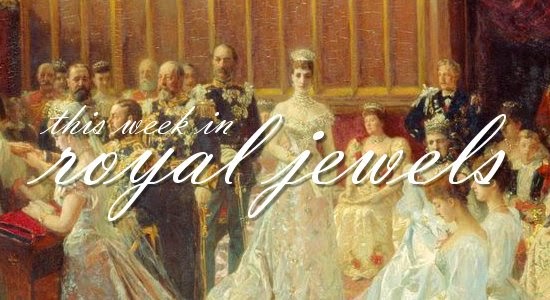
NOTES, PHOTO CREDITS, AND LINKS
1. Banner image: detail of The Marriage of George, Duke of York to Princess Mary of Teck (1894) by Laurits Tuxen. Image in the public domain; source here.
Sparkling Royal Jewels From Around the World

NOTES, PHOTO CREDITS, AND LINKS
1. Banner image: detail of The Marriage of George, Duke of York to Princess Mary of Teck (1894) by Laurits Tuxen. Image in the public domain; source here.
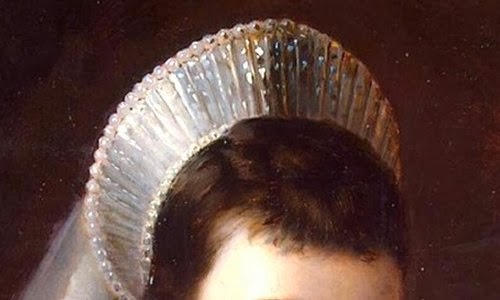 |
| Kokshnik tiara worn by Marie Feodorovna of Russia [1] |
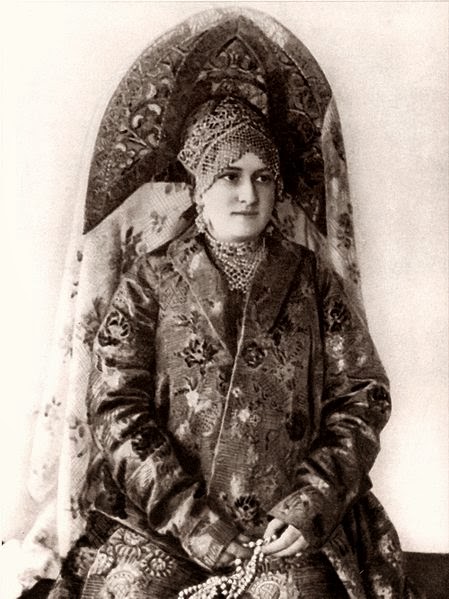 |
| Russian kokoshnik, ca. 1900 [2] |
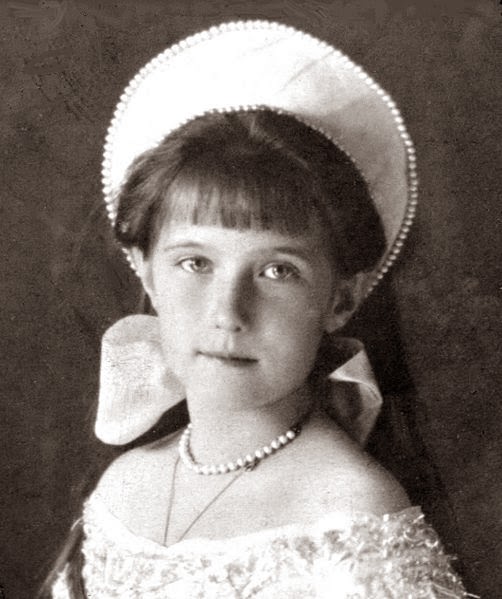 |
| Grand Duchess Anastasia [3] |
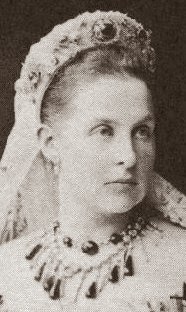 |
| Olga of the Hellenes [5] |
European tiara collections today still include many examples of kokoshnik-shaped tiaras, largely because so many grand duchesses married into various royal families. Queen Olga of the Hellenes, who was born Grand Duchess Olga Constaninovna of Russia, brought an emerald-studded kokoshnik (see the photograph at right) with her to her new country. Although the family has altered the tiara over the years, its current incarnation echoes its original kokoshnik shape. Many Russian grand duchesses received diamond fringe tiaras, which mimicked the shape of kokoshnik headdresses, as a part of their wedding trousseaux; you can see some of those fringe tiaras gracing the heads of their descendants today in countries like Denmark (inherited from Grand Duchess Anastasia Mikhailovna) and Germany (inherited via two Romanovs, Grand Duchess Maria Pavlovna and Grand Duchess Elena Vladimirovna). These halo-esque fringe tiaras were sometimes called tiaras russe because of their links to the Romanovs.
1. Detail of Ivan Kramskoi’s Portrait of Maria Fyodorovna (ca. 1880s); source here.
2. Photograph available via Wikimedia Commons; source here.
3. Photograph available via Wikimedia Commons; source here.
4. More on Queen Alexandra’s kokoshnik tiara can be found at the Royal Collection website.
5. Detail of photograph available via Wikimedia Commons; source here.
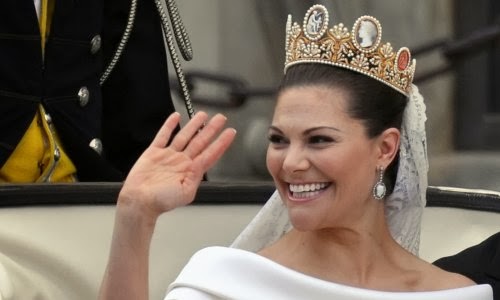 |
| Crown Princess Victoria wears the cameo parure [1] |
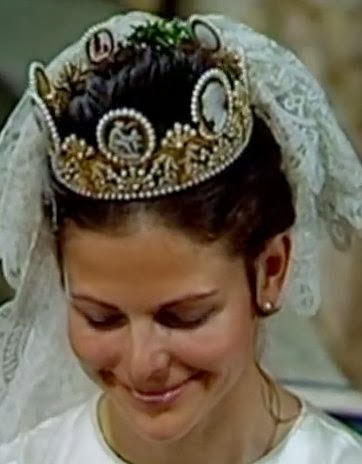 |
| Queen Silvia wears the cameo tiara [3] |
The Bernadottes of Sweden have some serious royal jewelry in their vaults, but one of their most prized sets is the cameo parure. According to De Kongelige Juveler, a Danish documentary about royal jewels, the cameo set was made by Marie-Étienne Nitot for the first wife of Napoleon Bonaparte, Joséphine de Beauharnais, in 1809 [2]. The first royal woman to be depicted wearing the parure in a portrait was Joséphine’s daughter, Hortense, who was briefly the Queen of Holland. It made its way into Swedish hands via Hortense’s niece, Joséphine of Leuchtenberg. The piece is especially romantic because of the designs depicted on the tiara’s cameos: scenes from the myth of Cupid and Psyche, in which a mortal woman and the god of love must overcome numerous obstacles before they can finally be married. It’s also gained a romantic aura because of its use as an important Bernadotte family wedding tiara. Queen Silvia and her elder daughter, Crown Princess Victoria, are among the royal women who have been married in the cameos. Queen Silvia remarked in the jewel documentary that she focused on two things during Victoria’s walk down the aisle: “the beauty of the tiara and her happiness.”
Queen Elizabeth II’s Engagement Ring
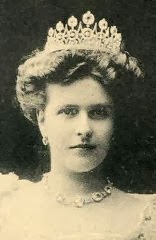 |
| Alice of Battenberg [4] |
Engagement rings are inherently romantic pieces of jewelry, and there are numerous famous royal examples. But for me, one of the most lovely is the diamond ring given by Lieutenant Philip Mountbatten (born Prince Philip of Greece and Denmark) to Princess Elizabeth of the United Kingdom. It’s not an especially unusual design: the ring consists of a three-carat diamond set in platinum and surrounded by five additional diamonds. But beyond the classic, elegant setting of the ring, and its status as a romantic gesture, the gems themselves have special significance: they were taken from a tiara once worn by Philip’s mother, Princess Alice of Battenberg. She gave the tiara to her son, who helped design the engagement ring using his mother’s diamonds. Prince Philip had a difficult childhood to say the least, and it’s a lovely tribute to his mother to have her diamonds used for his wife’s ring. And clearly it was a good start to a marriage — the couple have been married for 66 years and have four children, eight grandchildren, and four great-grandchildren.
The Khedive of Egypt Tiara
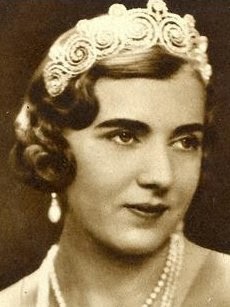 |
| Ingrid of Denmark [5] |
Made by Cartier, this lovely diamond and platinum scroll tiara was one of the many wedding gifts given in 1905 to Princess Margaret of Connaught on her marriage to Prince Gustaf Adolf of Sweden. It’s not the most elaborate of the gifts she received, but it is one of the most romantic, largely because of the identity of the giver. Margaret and Gustaf Adolf had met, fallen in love, and become engaged in Cairo; he’d been singled out as a marriage prospect for Margaret’s sister, Patricia, but he fell in love with Margaret instead. The tiara was a gift from Abbas II, the last Khedive of Egypt and Sudan; the gift therefore commemorated the couple’s first meeting and their wedding. We’ve talked quite a bit about Margaret’s tragic story on the blog; her early death was one of the reasons that her daughter, Queen Ingrid of Denmark, took extra care to remember her mother by wearing her jewelry. The Khedive tiara has become the official wedding tiara of all of Ingrid’s female descendants, crowning Danish, German, and Greek brides at their royal weddings.
Alexandra Feodorovna’s Aquamarine Brooch
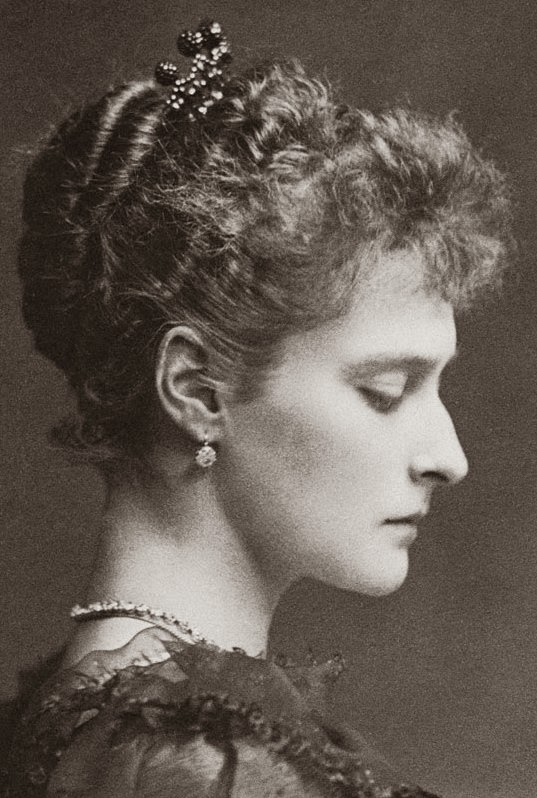 |
| Alix of Hesse [6] |
Nicholas II of Russia had to propose several times to Princess Alix of Hesse before she agreed to marry him, so it’s perhaps not surprising that once she said yes, he showered her with jewels. One of the most lovely of these tokens is an enormous aquamarine and diamond brooch, which he gave to her in August 1894. The brooch was purchased in St. Petersburg from Fabergé, and the beautiful aquamarine that dominates the piece was mined in Siberia. I’ve never seen an image of Alix wearing the brooch, but it’s a rare piece of her jewelry that still exists today. It was acquired by Wartski of London, a firm that specializes in Fabergé; they apparently didn’t know about its Romanov origins until they did additional research. Geoffrey Munn (he of the famous tiara tome), the managing director at Wartski, describes the provenance of the romantic engagement piece as “sort of stratospheric.” [7] You can see a photograph of the brooch here.
The Cambridge Emeralds
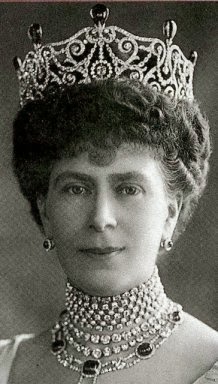 |
| Queen Mary [9] |
Our final romantic royal jewel story is a bit less conventional. The Cambridge emeralds weren’t worn at a wedding or given as an engagement present; instead, they were a gift from a prince to the mistress he loved. The deep green stones were won in a lottery by the Duchess of Cambridge. She gave them to her daughter, Princess Mary Adelaide, Duchess of Teck — better known to us as the mother of Queen Mary. But May didn’t inherit the emeralds from her mother; instead, when Mary Adelaide’s children divided her estate, the emeralds went to Prince Francis of Teck, one of Queen Mary’s younger brothers. Francis never married, but he was apparently very in love with his mistress, the Countess of Kilmorey (who was also reportedly one of the mistresses of King Edward VII). When Frank died in 1910, he left Nellie Kilmorey all of the jewels he’d inherited from his mother, including the family emeralds, much to the shock and dismay of his sister [8]. She was preparing for her coronation, and she wanted the Cambridge emeralds back. In the end, she had to purchase them from Lady Kilmorey; for good measure, she also had Frank’s will sealed to avoid public scandal. Shortly afterward, the emeralds were incorporated into the Delhi Durbar parure, worn by Mary at the coronation celebration in India in 1911 [10]. You’ll also see the some of the Cambridge emeralds, once gifted to a royal mistress, worn with the Vladimir tiara today by the current queen.